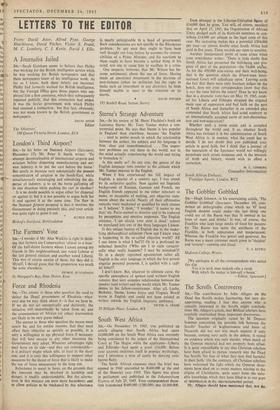South West Africa
SIR,—On November 19, 1965, you published an article alleging that South Africa had spent £6,000,000 on the South West Africa case currently being considered by the judges of the International Court at The Hague while the applicants—Liberia and Ethiopia—had spent a scant £14,000. Before your account enshrines itself in popular mythology, may I introduce a note of sanity by denying your figures flatly.
The South African expenses since the brief was opened in 1960 amounted to R600,000 at the end of the financial year 1965. This figure was given in parliament and published in the Johannesburg Express of July 25, 1965. Your correspondent there- fore transmuted R600,000 (1300.000) into £6,000,000.
Even stranger is the Liberian-Ethiopian figure of £14,000 that he gives. You will, of course, recollect that on April 15, 1965, the Organisation of African Unity pledged each of its thirty-six members to con- tribute £14,000 per annum to the legal costs of this case. My reckoning makes this a potential £504,000 per year—or almost double what South Africa had paid in five years. These records are open to scrutiny.
Another fundamental point of issue arises when your contributor writes: 'There is little doubt that South Africa has promoted the well-being and pro- gress of part of the population—the 74,000 whiles. As for the 450,000 non-whites and their well-being, that is the question which the fifteen-man Inter- national Court will adjudicate upon.' Leaving aside the fact that there were only fourteen judges on the bench, does not your correspondent know that this is not the issue before the court? Does he not know that in a dramatic vole-face on May 19, 1965, coun- sel for Liberia and Ethiopia dropped the original main case of oppression and bad faith on the part of South Africa and thereafter in an amended plea contended that South Africa had acted contrary to an internationally accepted norm of non-discrimina- tion and non-separation?
Whether such a norm exists and is accepted throughout the world and, if so, whether South Africa has violated it in her administration of South West Africa is, in essence, what the court has to decide. I do not doubt that you published your article in good faith, but I think that a journal of the reputation of the Spectator would not willingly perpetuate such arrant nonsense and, in the interests of truth and history, would wish to effect a correction.
M. C. LOMBERG
Counsellor (Information) South African Embassy, Trafalgar Square, London, WC2






























 Previous page
Previous page